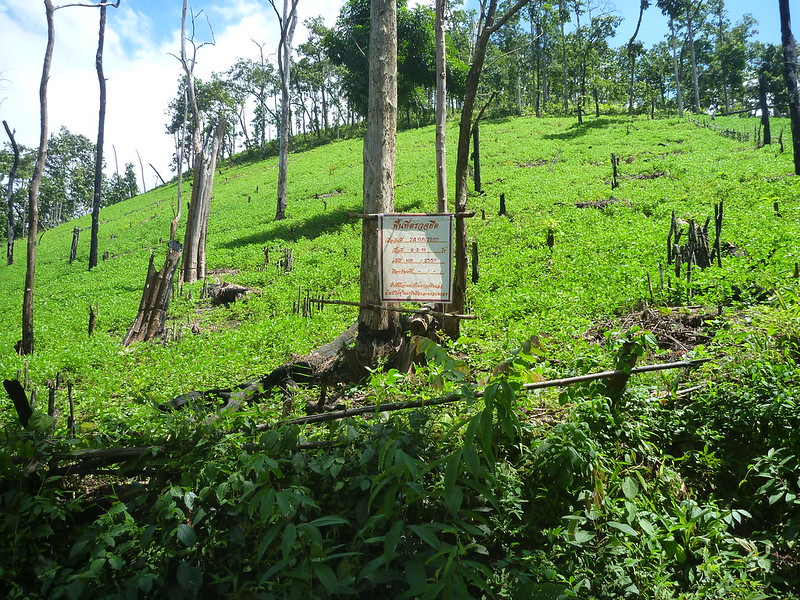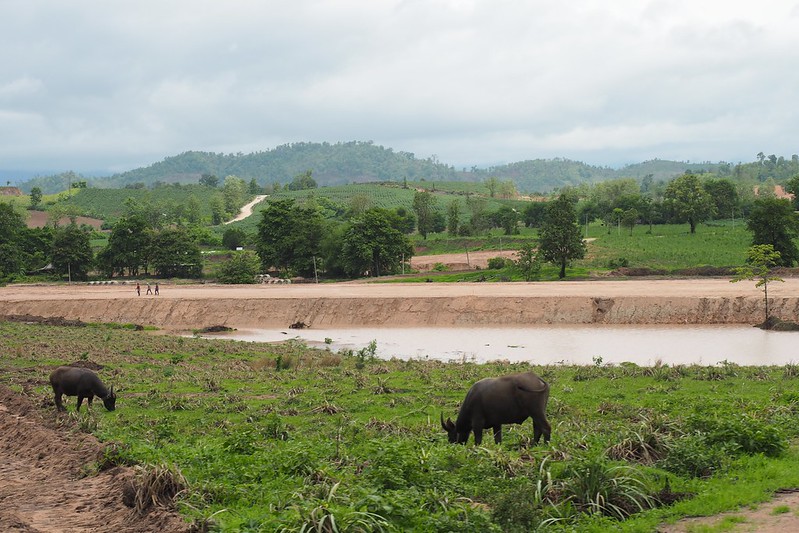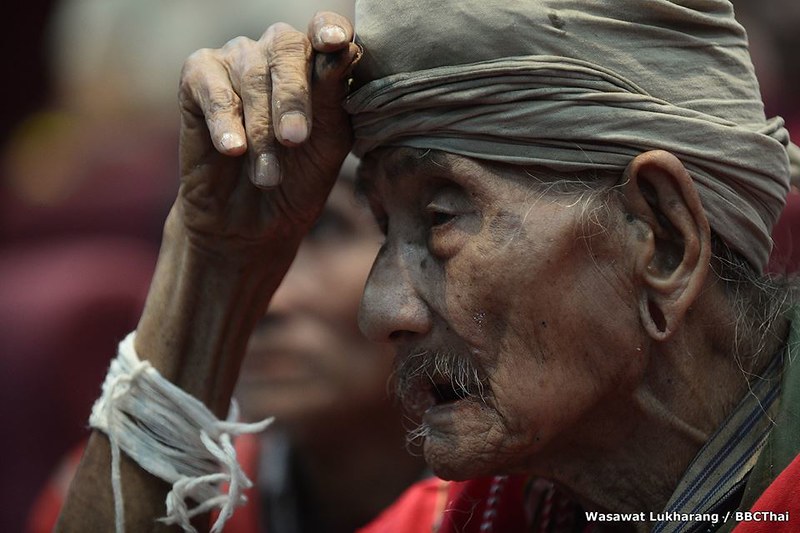After three years of the junta’s ‘returning happiness’ mission, the country’s poor and ethnic minorities are still suffering from the junta’s ‘return the forest’ policy while the junta opens up more land for investors and cuts environmental regulations for big business.
“In the next 10 years, the suspension of land rights will be a big issue….the Special Economic Zones in Thailand are modelled after those in Lao. It’s like a process of buying a whole nation in which large areas of land are being bought by investors. We don’t even know what they will do with the land,” says Pinkaew Laungaramsri, Asst Prof in the Department of Sociology and Anthropology, Chiang Mai University.
About a month after the coup d’état in May 2014, the Thai junta issued National Council for Peace and Order (NCPO) Order No. 64/2014, a master plan to replant forests nationwide, which lays out strict legal measures against land encroachers and poachers of forest products.
The order on one level is successful in dealing with resorts and plantations of investors who encroached into protected forests. However, it has also resulted in the eviction of thousands of villagers, many of whom have been settled long before the areas were officially designated as national parks or protected areas. According to the NGO Coordinating Committee on Development (NGO-COD), approximately 1.2 million people living on land that overlaps protected areas could be affected.
In parallel with the ‘return the forest’ policy, the junta has initiated a master plan to attract investors by opening SEZs across the country while cutting down environmental regulations to attract big capital.

The Forestry Department reclaims Karen farmland in Mae Ngao National Park and puts up a sign reads ‘This land is reclaimed on 24 July 2014, acre: 6-3-19, case: 106/2014. The authority reclaims this plot of land and no one can possess or reserve it’ (file photo)
The junta’s universal magic wand
It is not unconstitutional to use Section 44 of the Interim Constitution to bypass regulations and normal procedures in the development of the Eastern Economic Corridor (EEC) project, Meechai Ruchuphan, chair of the junta-appointed Constitution Drafting Committee told the media on 24 May 2017.
The statement came a day after Gen Prayut Chan-o-cha, the junta leader and Prime Minister, declared that the NCPO had just used its authority under Section 44 to speed up the process of developing the EEC. The statement of the CDC chairman seems to confirm the ruling of the Supreme Administrative Court on 4 November 2016 not to accept a complaint submitted by eight civil society groups led by Enlaw Thai Foundation to repeal NCPO Order No. 4/2016. The Court reasoned that all orders enacted under Section 44 are lawful.
The controversial January 2016 Order exempts all kinds of power plants, water treatment plants, garbage disposal and collection plants, recycling plants, and gas processing plants from regulations under the Town Planning Act.
Promoting his vision for the ASEAN Economic Community (AEC), the junta leader in May 2015 invoked his authority under Section 44 to announce NCPO Order No. 17/2015. The order mandates turning large areas in Tak, Mukdahan, Nong Khai, Sa Kaeo and Trat provinces, bordering Myanmar, Laos, and Cambodia, into SEZs, where deregulation of industry and tax cuts are offered to lure investors. In addition to the pilot SEZ projects in these five provinces, more land in five other provinces, Chiang Rai, Nakhon Phanom, Kanchanaburi, Songkhla, and Narathiwat, is to be expropriated and cleared for SEZs.
Many communities have faced eviction orders as the authorities push ahead with SEZ construction. In Sadao District in the southern province of Songkhla, where 1,207 rai (193 ha) has been reclaimed by the Treasury Department in preparation for SEZ construction, 300 people are currently contesting an eviction order.
Facing a similar eviction order, representatives from Wang Takhian Village in Tha Sai Luat Subdistrict, Mae Sot District in northern Tak Province filed a lawsuit in November 2016 against the Treasury Department and the Department of Lands at Phitsanulok Province Administrative Court.
The villagers — most of whom are members of Khon Mae Sot Rakthin (KMSR), a local activist group — accused the two state agencies of ‘unlawfully’ preparing to hand over the land upon which they have been living for generations to the Industrial Estate Authority of Thailand (IEAT) for SEZ construction.

An empty land plot in Wang Thakien village of Tha Sai Luat Subdistrict which has already been cleared in preparation for construction of the SEZ (file photo)
Marginalised communities pay the price
According to NGO-COD, in the first year after the enactment of the Junta’s master plan to restore Thailand’s national forest cover, at least 103 small-scale farmers were accused of encroaching on protected areas and almost 1,800 people in Isaan have been prohibited from using their farmland and are about to receive court warrants for alleged encroachment.
The policy purportedly targets commercial investors who own and exploit thousands of rai of public and protected land to grow rubber, cassava, other cash crops, or build resorts. However, most villagers who have been affected by the policy claimed that they are poor farmers who are merely trying to make a living on land they have farmed for decades.
Lertsak Khamkongsak, coordinator of the Eco-Culture Study Group, pointed out that tensions between forestry officials and local residents will only grow stronger if the government continues to abuse its special powers. The current land law, enacted in 1953, does not protect the rights of local people to their community and home forests.
In this way, the land law allows authorities to pursue legal action against local villagers, even those who have rooted their lives in the area for centuries, added Lertsak.
This interpretation was reflected in the Administrative Court’s recent ruling in favour of park officials who burnt down the houses of indigenous Karen forest dwellers in Kaeng Krachan National Park.
Surachai Throngngam, secretary-general of the EnLaw Foundation, said that the court’s verdict on the Karen villagers means the forced evictions were legal. This precedent can now be used as a model for forestry officials to carry out their mission to protect natural resources without consideration or fear of legal action by the Karen and other ethnic minorities whose livelihood is connected to the forest.

Ko-i Meemi, a 105-year-old spiritual leader of a Karen community in Kaeng Krachan National Park of Phetchaburi Province at the Administrative Court on 7 September 2016 (Photo from: the BBC Thai)
He warned that the organic laws currently being drafted for the new constitution could further harm the environment, the land, and other natural resources due to the exclusion of community rights, which itself indicates a lack of public participation.
According to Land Watch Thai (LWT), the junta’s ‘return the forest’ policy was formulated only by 17 people, 11 of whom are from the military. Therefore, the policy is flawed as it does not take in the voices of civil society groups and experts.
In the last three decades, civil society groups have been campaigning for laws to allow people to live within forests as a means to preserve the forests sustainably. However, the junta Order has rendered their efforts useless.
“The policy of the NCPO for resolving land issues is to centralise the process in land management, which ignores and forbids public participation and the right to manage community land,” LWT concludes in their article about the junta’s land policy.

